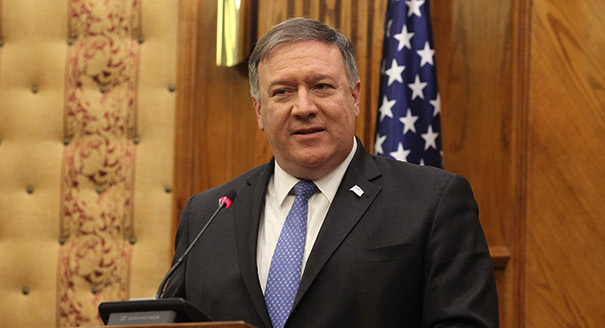Tehran’s attacks are reshaping the security situation in the Middle East—and forcing the region’s clock to tick backward once again.
Amr Hamzawy
{
"authors": [
"Richard Sokolsky",
"Aaron David Miller"
],
"type": "legacyinthemedia",
"centerAffiliationAll": "",
"centers": [
"Carnegie Endowment for International Peace"
],
"collections": [],
"englishNewsletterAll": "",
"nonEnglishNewsletterAll": "",
"primaryCenter": "Carnegie Endowment for International Peace",
"programAffiliation": "",
"programs": [],
"projects": [],
"regions": [
"North America",
"United States"
],
"topics": [
"Political Reform",
"Foreign Policy"
]
}
Source: Getty
In Washington, as the old saw goes, personnel is policy. And fifteen months into the Trump presidency, big changes are underway in the foreign policy team.
Source: CNN
In Washington, as the old saw goes, personnel is policy. And 15 months into the Trump presidency, big changes are underway in the foreign policy team. Perhaps the biggest are the ascent of Trump favorite and newly confirmed Secretary of State Mike Pompeo and the sharp-elbowed new National Security Adviser John Bolton. Invariably these strong players are bound to crowd out others who have benefited from the first year's chaos and policy vacuum.
In other words: Move over, Nikki Haley and Jared Kushner.
It's still too early to know precisely what the new pecking order will be. After all in Trumpland bright and shiny objects have a way of losing their luster. But here are the critically important storylines to watch.
In Trump's circle, there's only one star and one decider, and there are real risks to anyone who -- like Icarus in Greek mythology -- flies too close to the sun. Pompeo could crash and burn, but he seems well positioned to provide the administration with what it needs and has sorely lacked -- a secretary of state who is the most important repository of foreign policy authority below the President.
Pompeo reportedly has Trump's confidence and knows how to handle him (until he doesn't). And unlike Rex Tillerson, Pompeo has a chance to rebuild the State Department and deploy it in the service of the President's goals. In the end, however, the greatest challenge to Pompeo's success or failure won't be the leaders of North Korea, Russia, China, Iran and Syria but the mercurial Trump. To survive and thrive, Pompeo will have to both stand up and suck up to the President. Whether he can pull off this delicate high-wire act is an open question.
UN Ambassador Nikki Haley and presidential senior adviser Jared Kushner no longer appear to be the bright stars in the national security firmament they were only a short time ago. Haley successfully outmaneuvered a weak and publicity shy secretary of state and a dysfunctional State Department to hog the foreign policy limelight. And no doubt she will remain popular as a rising star in the Republican Party. But Pompeo is no Tillerson. Unlike the hapless former secretary of state, he has a close relationship with Trump and more Washington experience, seems determined to put the State Department back in the foreign policy driver's seat, is strong willed and assertive, and knows how to play to foreign policy constituencies.
Pompeo's star will eclipse that of Haley -- who recently angered Trump, and not for the first time, with a statement about new sanctions against Russia -- and she will likely assume a lower public profile in deference to Pompeo, whose confirmation hearings she attended as a show of support. Kushner's wings have been clipped by the Mueller investigation; he's keeping his head down and out of the line of fire. He can claim no foreign policy successes; Middle East peace diplomacy, which he owned lock, stock and barrel, is going nowhere. Pompeo knows it and seems determined to wrestle back foreign policy authority from the White House. The odds are in his favor.
Much has already been made of the emerging tension between the hawkish Bolton, Trump's truculent new adviser, and the more prudent and pragmatic secretary of defense. Not surprisingly, James Mattis has downplayed any rivalry. But there are reports that he opposed Bolton's appointment. And it's clear that on Iran and Syria there are differences. Bolton apparently pushed for more expansive strikes against Syria in response to Assad's use of chemical weapons earlier this month, posing a risk of escalatory responses from Russia and Iran. But Mattis' recommendation for a proportionate and limited response won out, which says something about who Trump trusts when it comes to decisions about war and peace.
Mattis -- a proponent of staying in the Iran nuclear deal -- will likely lose that round to Bolton. Moreover, the addition of the hardliner Pompeo to the mix could tilt the bureaucratic balance of power against the secretary of defense on other foreign policy issues. But don't bet the farm on it. Bolton will make an effort to control the decision-making process as any good national security adviser would. But policy is another matter.
On North Korea, where Bolton has called for regime change, Trump wants a deal, not war; and unlike Bolton, Trump doesn't want to confront Iran or Russia in Syria. Mattis is more or less indispensable to Trump, Bolton isn't. After all, Ronald Reagan had six national security advisers, Trump has already had three.
Aside from the bureaucratic turf wars, there's the struggle to win Trump's mind. The issue is not so much hawks versus doves or the clash of competing foreign policies. Rather, it is between those who can make Trump look good and more popular and notch foreign policy successes he can tout as the likes of which the American people have never seen, and those who cannot.
Trump is desperate to ride his summit with Kim Jong Un into the history books. Pompeo is a bona fide hawk. But having met personally with Kim, he is now invested in a successful summit. And he's smart enough to understand that peace on the Korean Peninsula is more likely to earn the President a Nobel Peace Prize and make him Time's Person of the Year, while war will tar him as a loser.
A historic breakthrough with North Korea also offers Trump an opportunity to gloat over former President Barack Obama, to preen on the world stage, and to earn the respect he craves. The last thing Trump wants is a chorus of squawking hawks -- Pompeo, Bolton and Haley -- stealing his glory.
Whoever sits beside him at the Cabinet table, the mercurial and often impetuous Trump will remain at the center of America's foreign policy. Whether his new foreign policy team will have any better luck than the old one in managing the President or the nation's foreign policy remains to be seen.

Nonresident Senior Fellow, Russia and Eurasia Program
Richard Sokolsky is a nonresident senior fellow in Carnegie’s Russia and Eurasia Program. His work focuses on U.S. policy toward Russia in the wake of the Ukraine crisis.

Senior Fellow, American Statecraft Program
Aaron David Miller is a senior fellow at the Carnegie Endowment for International Peace, focusing on U.S. foreign policy.
Carnegie does not take institutional positions on public policy issues; the views represented herein are those of the author(s) and do not necessarily reflect the views of Carnegie, its staff, or its trustees.
Tehran’s attacks are reshaping the security situation in the Middle East—and forcing the region’s clock to tick backward once again.

Amr Hamzawy
Only collective security can protect fragile economic models.

Andrew Leber
Europe’s reaction to the war in Iran has been disunited and meek, a far cry from its previously leading role in diplomacy with Tehran. To avoid being condemned to the sidelines while escalation continues, Brussels needs to stand up for international law.

Pierre Vimont
In 2021, the U.S. government began to consider how to address climate migration. The outcomes of that process offer useful takeaways for other governments.

Jennifer DeCesaro
On the last day of the India AI Impact Summit, India signed Pax Silica, a U.S.-led declaration seemingly focused on semiconductors. While India’s accession to the same was not entirely unforeseen, becoming a signatory nation this quickly was not on the cards either.

Konark Bhandari